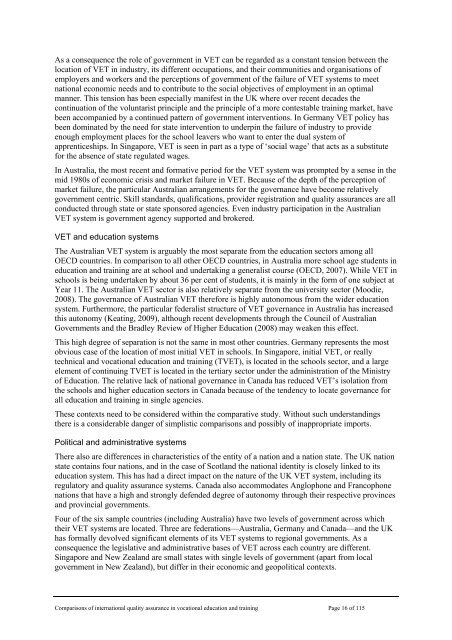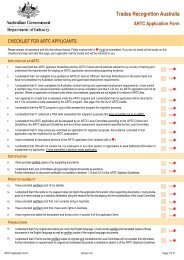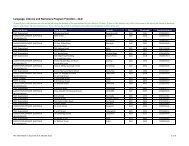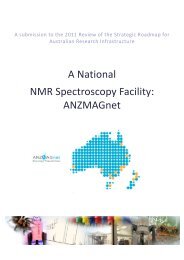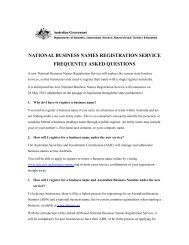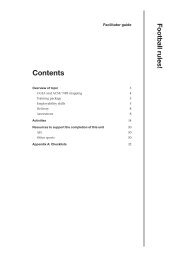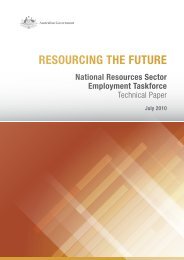Review - Department of Innovation, Industry, Science and Research
Review - Department of Innovation, Industry, Science and Research
Review - Department of Innovation, Industry, Science and Research
Create successful ePaper yourself
Turn your PDF publications into a flip-book with our unique Google optimized e-Paper software.
As a consequence the role <strong>of</strong> government in VET can be regarded as a constant tension between the<br />
location <strong>of</strong> VET in industry, its different occupations, <strong>and</strong> their communities <strong>and</strong> organisations <strong>of</strong><br />
employers <strong>and</strong> workers <strong>and</strong> the perceptions <strong>of</strong> government <strong>of</strong> the failure <strong>of</strong> VET systems to meet<br />
national economic needs <strong>and</strong> to contribute to the social objectives <strong>of</strong> employment in an optimal<br />
manner. This tension has been especially manifest in the UK where over recent decades the<br />
continuation <strong>of</strong> the voluntarist principle <strong>and</strong> the principle <strong>of</strong> a more contestable training market, have<br />
been accompanied by a continued pattern <strong>of</strong> government interventions. In Germany VET policy has<br />
been dominated by the need for state intervention to underpin the failure <strong>of</strong> industry to provide<br />
enough employment places for the school leavers who want to enter the dual system <strong>of</strong><br />
apprenticeships. In Singapore, VET is seen in part as a type <strong>of</strong> ‘social wage’ that acts as a substitute<br />
for the absence <strong>of</strong> state regulated wages.<br />
In Australia, the most recent <strong>and</strong> formative period for the VET system was prompted by a sense in the<br />
mid 1980s <strong>of</strong> economic crisis <strong>and</strong> market failure in VET. Because <strong>of</strong> the depth <strong>of</strong> the perception <strong>of</strong><br />
market failure, the particular Australian arrangements for the governance have become relatively<br />
government centric. Skill st<strong>and</strong>ards, qualifications, provider registration <strong>and</strong> quality assurances are all<br />
conducted through state or state sponsored agencies. Even industry participation in the Australian<br />
VET system is government agency supported <strong>and</strong> brokered.<br />
VET <strong>and</strong> education systems<br />
The Australian VET system is arguably the most separate from the education sectors among all<br />
OECD countries. In comparison to all other OECD countries, in Australia more school age students in<br />
education <strong>and</strong> training are at school <strong>and</strong> undertaking a generalist course (OECD, 2007). While VET in<br />
schools is being undertaken by about 36 per cent <strong>of</strong> students, it is mainly in the form <strong>of</strong> one subject at<br />
Year 11. The Australian VET sector is also relatively separate from the university sector (Moodie,<br />
2008). The governance <strong>of</strong> Australian VET therefore is highly autonomous from the wider education<br />
system. Furthermore, the particular federalist structure <strong>of</strong> VET governance in Australia has increased<br />
this autonomy (Keating, 2009), although recent developments through the Council <strong>of</strong> Australian<br />
Governments <strong>and</strong> the Bradley <strong>Review</strong> <strong>of</strong> Higher Education (2008) may weaken this effect.<br />
This high degree <strong>of</strong> separation is not the same in most other countries. Germany represents the most<br />
obvious case <strong>of</strong> the location <strong>of</strong> most initial VET in schools. In Singapore, initial VET, or really<br />
technical <strong>and</strong> vocational education <strong>and</strong> training (TVET), is located in the schools sector, <strong>and</strong> a large<br />
element <strong>of</strong> continuing TVET is located in the tertiary sector under the administration <strong>of</strong> the Ministry<br />
<strong>of</strong> Education. The relative lack <strong>of</strong> national governance in Canada has reduced VET’s isolation from<br />
the schools <strong>and</strong> higher education sectors in Canada because <strong>of</strong> the tendency to locate governance for<br />
all education <strong>and</strong> training in single agencies.<br />
These contexts need to be considered within the comparative study. Without such underst<strong>and</strong>ings<br />
there is a considerable danger <strong>of</strong> simplistic comparisons <strong>and</strong> possibly <strong>of</strong> inappropriate imports.<br />
Political <strong>and</strong> administrative systems<br />
There also are differences in characteristics <strong>of</strong> the entity <strong>of</strong> a nation <strong>and</strong> a nation state. The UK nation<br />
state contains four nations, <strong>and</strong> in the case <strong>of</strong> Scotl<strong>and</strong> the national identity is closely linked to its<br />
education system. This has had a direct impact on the nature <strong>of</strong> the UK VET system, including its<br />
regulatory <strong>and</strong> quality assurance systems. Canada also accommodates Anglophone <strong>and</strong> Francophone<br />
nations that have a high <strong>and</strong> strongly defended degree <strong>of</strong> autonomy through their respective provinces<br />
<strong>and</strong> provincial governments.<br />
Four <strong>of</strong> the six sample countries (including Australia) have two levels <strong>of</strong> government across which<br />
their VET systems are located. Three are federations—Australia, Germany <strong>and</strong> Canada—<strong>and</strong> the UK<br />
has formally devolved significant elements <strong>of</strong> its VET systems to regional governments. As a<br />
consequence the legislative <strong>and</strong> administrative bases <strong>of</strong> VET across each country are different.<br />
Singapore <strong>and</strong> New Zeal<strong>and</strong> are small states with single levels <strong>of</strong> government (apart from local<br />
government in New Zeal<strong>and</strong>), but differ in their economic <strong>and</strong> geopolitical contexts.<br />
Comparisons <strong>of</strong> international quality assurance in vocational education <strong>and</strong> training Page 16 <strong>of</strong> 115


